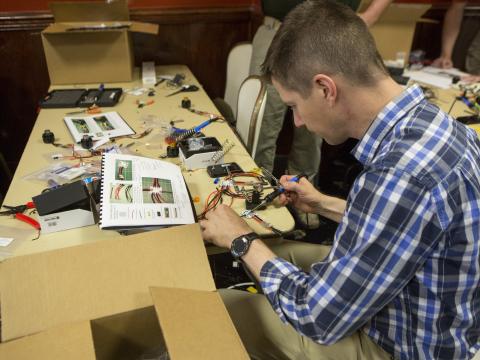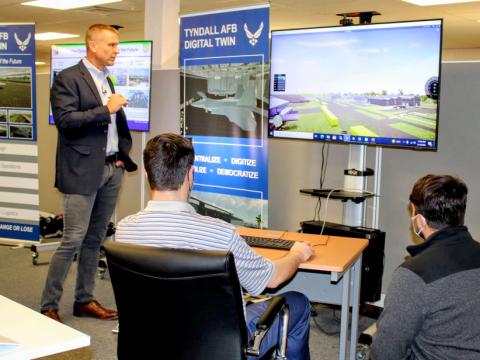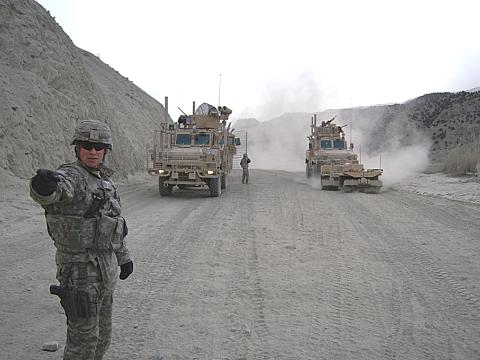Electronic Contracting Cuts Red Tape
Paperless environment streamlines processes, saves time.
After participating in one of the first multinational exercises to use the U.S. Defense Department’s new electronic procurement system, U.S. Army officials are touting the benefits of using paperless contracting in a contingency operation. The technology allowed procurement personnel to save time, respond quickly to customers’ needs and work efficiently with contractors from several countries.
Adequate planning and training were key to the successful use of a relatively new system in an exercise that involved U.S., Thai and Singaporean troops. Participants in COBRA GOLD 2001 employed the Standard Procurement System (SPS), which was developed by American Management Systems, Fairfax, Virginia (SIGNAL, June 2001, page 41).
COBRA GOLD is a joint/combined exercise and one of a series of U.S.-Thai military exercises designed to ensure regional peace and strengthen the ability of the Royal Thai armed forces to defend Thailand or respond to regional contingencies. The 2001 staging of the exercise, held annually in Thailand, focused on peace enforcement operations. It was the first time in the 20-year history of the event that the training moved from a pure defense of Thailand scenario to a U.N. peace enforcement action. For the event, troops from the three nations worked together across 558 miles of Thai countryside in a simulated contingency operation.
Six months before thousands of multinational troops landed in eastern Asia, U.S. Army contracting officers were already there preparing for the exercise. Maj. David Brock, USA, chief of contingency contracting, U.S. Army Pacific, Fort Shafter, Hawaii, is in charge of the Army’s contracting activities in 41 of the nations dotting the Asia-Pacific region. He supervised all contracting needs for the ground-, air- and sea-based troops that participated in cobra gold 2001.
Under Maj. Brock’s direction, Capt. Steve Ludwig, USA, the exercise’s lead contracting officer, and Capt. Mark Johnson, USA, subject matter expert (SME), scoped the site and laid the groundwork for the multimillion dollar, two-week exercise.
Capt. Ludwig was a contracting officer in COBRA BOLD 2000, so he was familiar with the territory and with the challenges of trying to do business in a foreign environment where language barriers are mere molehills compared to the mountains of cultural differences. Capt. Johnson, on the other hand, had just returned from a tour in Bosnia and completed procurement officer training where he received his Level I certification. “I had just come off my tank in Bosnia and was assigned to be the SME for SPS in the largest exercise in the Pacific Rim,” Capt. Johnson recalls. “I only had one-and-a-half months of schooling and 45 days in garrison contracting working with SPS. My point is that people can make it happen if they choose SPS to be their system. I made it happen with minimal experience.”
Planning and preparation were key factors in the exercise’s success, beginning with the site visit and continuing with a planning conference held a month later by Capt. Ludwig at Fort Shafter. Capt. Johnson, U.S. Marine Corps and U.S. Air Force contracting officers, logisticians and fiscal officers from all of the military services attended the meeting. It was the first of several planning sessions.
“The initial plan was to do contracting for COBRA GOLD like we had always done contracting for the exercise,” Capt. Ludwig explains. “But then we started thinking about SPS and realized its potential. I’ll admit, I was skeptical about using it. I had to go through that whole ‘change management’ thing myself. I think that’s the biggest hurdle for all organizations out there. It’s a mindset change. There are a few headaches involved in learning a new system, but with SPS, the rewards far outweigh the negatives.”
Capt. Johnson explains the final motivation behind the decision to go with SPS—and only SPS—in COBRA GOLD. “Once we knew we had the full support of the ASAALT [assistant secretary of the Army for acquisition, logistics and technology], including American Management Systems, we felt better about it. And once we started mapping out the possibilities and potential for making the whole system paperless—from logistics to contracting to financial management—our adrenaline started pumping,” he pauses. “We were going to make it work.”
Even without implementing a new electronic business system, contingency contracting is challenging, procurement experts agree. Not only do the lives of soldiers depend on the timely delivery of supplies and services, but also contracting professionals must oftentimes work in conditions not conducive to office processes—tasks such as filing, faxing and duplicating documents. They also must anticipate the needs of troops on the frontlines and work directly with logistical planners, financial managers and foreign vendors to ensure that contracted items are delivered on time.
“Contingency contracting … is an unknown. You don’t know what you’re getting into, who the vendors are, what their capabilities are, and even who your customers are. It could be an Army or a [U.S.] Navy or an Air Force customer or even a joint command. It’s challenging,” Maj. Brock explains.
However, Capt. Ludwig says that the contingency contracting challenge did not faze him. He was more concerned with preparing the procurement team for an exercise that would be entirely different from past cobra gold events. Solicitations would be prepared using macros that work with SPS to allow for the electronic preparation and issuance of solicitations through the Internet. Vendors could respond to the solicitation and be notified of their selection status electronically. When an order or modification was issued, it arrived either through the Internet or a fax machine.
As COBRA GOLD approached, solicitation bids were evaluated and vendors were notified and awarded their contracts through a modified version of SPS. Vendor information was loaded into the database as was the information needed for exercise participants.
Plans were made for a wireless and paperless system for cobra gold; however, a hard-wire backup was also put into place. Data and files were transferred from paper-based systems into the new system, which was tested at Fort Shafter. The wireless, paperless system passed numerous tests after a handful of minor workarounds were developed to enhance SPS so that it would perform for logistics, contracting and financial managers during the exercise.
Three months before COBRA GOLD began, logistical, fiscal and contracting personnel participated in a five-day training course on SPS use. “Some of the contracting officers from the Air Force and the Marines were familiar with SPS from their base contracting office; however, their experience was minimal,” Capt. Ludwig notes.
Two months before 5,000 American troops landed in Thailand for cobra gold, the contracting team set up its office in Bangkok. Even before they turned on their computers, the race had begun. The first wave of requests for supplies and services was being transmitted via electrons from field commanders, some of whom were more than 5,000 miles away.
“We received the requests [from the field] electronically and prepared the orders using SPS. Then, depending on the vendor, we either sent them an electronic copy of the order or faxed it to them through the Internet,” Capt. Johnson explains. “Either way, we didn’t use a single sheet of paper.”
The team had a variety of equipment ranging from the minimum required to run SPS, a Pentium II, 64-megabyte random access memory (RAM), up to the top-of-the-line Pentium 700 with 512-megabyte RAM and workstations running on 128-megabyte RAM. They also had scanners, CD-ROM burners and external hard drives.
The equipment and months of planning and preparation indicated that the old way of doing the business of procurement was becoming a thing of the past, team members agree. During traditional, paper-based COBRA GOLD exercises, more than 75,000 sheets of paper are used. In going paperless, COBRA GOLD contracting officers saved both paper and time by operating concurrently with their logistical and fiscal counterparts.
In past COBRA GOLD exercises, a requiring activity—the customer—would prepare a request, print several copies and deliver the request to the contracting activity. Each request was several pages long, and multiple requests arrived on any given day. Contracting officers would then re-enter the information into their own system, print out a lengthy contract award, make several copies and deliver a copy to the vendor, usually putting a rush on the delivery to ensure it arrived in time for the warfighters’ needs. Several copies of the contract would have to be sent to both the customer and to the fiscal managers in the exercise, who would then re-enter the information into their own system and print several copies of the contract. Frequently, as is expected during contingency operations, the customer needed a last-minute change to the order, which meant the same paper cycle was repeated.
With the paper system, contracting officers did not have time to double-check and triple-check with foreign vendors to ensure they clearly understood the requirements, received last-minute changes and agreed to demanding delivery schedules.
“In past exercises, QA/QC [quality assurance/quality control] suffered because we just didn’t have the time to devote to it that we had when we used SPS,” Capt. Ludwig notes. “We were just trying to keep our heads above water. This year, we did a better job because we could spend quality time with vendors and with our customers.”
Maj. Brock agrees. “It was the concurrent processing vice the sequential processing with our logistics and fiscal counterparts that really bought us time. When you’re in a different country, the more interaction you can have with your vendors, the better service and support you’re going to receive from them and the better service and support the soldiers will receive,” he says.
Streamlining the office processes allowed Khun Chantana, the exercise’s office manager and only local hire, to help the officers with translation duties. Normally, because of the voluminous filing, copying and mailing requirements, COBRA GOLD contracting teams hired three local residents to help with office tasks. This year, only one was needed, which was another cost-saving benefit of using an electronic business system.
SPS worked well in COBRA GOLD 2001 for several reasons, military officials point out. First, the team was well prepared. Unlike an actual contingency, they had months to get ready. They anticipated, identified and planned for problems and issues.
Second, as part of their in-depth preparation for cobra gold, every member of the team learned how to use SPS. “You’re going to get out of something whatever you put into it,” Capt. Ludwig says. “The more time and preparation you put in up front, the less time you have to spend later to fix problems. Had we not taken the time to train our fiscal and our log[istical] guys, even our contracting officers, we would have suffered. We continued to train even during the exercise. You don’t just learn the system and walk away. You continue to train to stay proficient.”
Capt. Johnson adds that people must prepare to use an e-contracting system just like they would with any major system. “I look at SPS like any other major tool or system. I wouldn’t send soldiers into battle with a new weapon unless I knew they had significant training with it. They need to know how it operates. They need to feel comfortable with it. The same goes for SPS.”
The team also trained COBRA GOLD vendors on using the new business processes and documentation associated with paperless contracting. Two-thirds of the vendors had participated in COBRA GOLD at least once before but were not familiar with SPS, so the training was necessary to ensure operations proceeded smoothly.
Participants agree that team members were determined to make the system work. Until this point, the U.S. government had not considered the special requirements of contingency contracting when developing requirements for SPS. As a result of COBRA GOLD 2001, however, these specialized requirements are now being considered.
“A benefit of SPS, which we hope to see in the future, is when we’re establishing a joint contracting office in a contingency environment, the learning curve will be minimal,” Maj. Brock predicts.
Linda Polonsky-Hillmer specializes in writing about defense technology and has worked with the SPS program since its inception.


